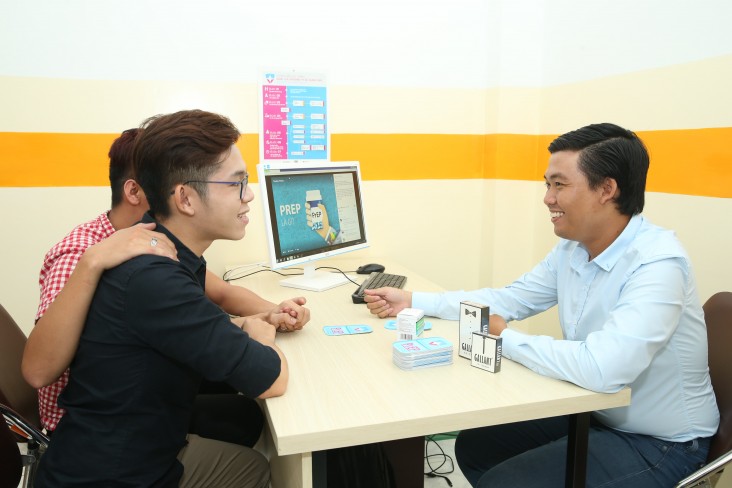Speeches Shim

Over the past several decades, the Government of Vietnam has made remarkable strides in improving the health of the country’s citizens. However, public health concerns have the potential to threaten sustained economic progress. The emergence of drug-resistant tuberculosis, ongoing outbreaks of highly pathogenic influenza in animals and humans, the continued threat of the HIV epidemic among key populations, fragile health systems, and human resource constraints could limit Vietnam’s continued growth. Additionally, limited health services for vulnerable groups, including ethnic minorities, have led to significant gaps in service delivery, resulting in lower health indicators and reduced economic opportunities.
The USAID Vietnam Health program aims to increase prevention and control of infectious diseases by building sustainable health systems that support Vietnam’s efforts to plan, finance, and implement solutions. Under the U.S. President’s Emergency Plan for AIDS Relief (PEPFAR), USAID manages large-scale activities to help prevent and treat HIV/AIDS, and in collaboration with the Government of Vietnam and community based organizations, USAID provides funding and technical support to expand and improve services for the prevention and control of HIV and TB, advance local ownership of HIV and TB prevention and treatment, and increase Vietnam’s effectiveness to control priority global health threats posed by infectious diseases.
PROJECTS
-
Meeting Targets and Maintaining Epidemic Control (EpiC): strengthens and delivers innovative enhancements in HIV services and helps transition the HIV/AIDS response to host country ownership through targeted technical assistance in six provinces in Vietnam in order to accomplish the country’s ambitious “90-90-90” targets. 2020-2024, est. $16 million.
-
Healthy Markets: aims to grow a viable market for HIV-related goods and services and works with the government of Vietnam and other stakeholders to access and demand for HIV prevention, testing, and treatment. 2014-2021, $20.7 million.
-
USAID Enhanced Community HIV Link - Southern: identifies high risk, hard-to-reach people living with HIV in Ho Chi Minh City and Dong Nai province and connects them to testing and treatment services. 2016-2021, $4.1 million.
-
USAID Enhanced Community HIV Link - Northern: expands community-based HIV services provided by civil society organizations and community-based organizations. 2017-2022, $4.5 million.
-
Local Health System Sustainability (LHSS): works with the Government of Vietnam to increase domestic financing for health and strengthen the sustainability of domestic financing mechanisms for Vietnam’s greater financial, administrative, and technical ownership of its HIV and TB response. 2020-2024, $12.3 million.
-
SI System Strengthening: provides technical assistance in the strengthening of national, provincial, and community-based strategic information systems for epidemic monitoring and control in tracking the achievement of project targets and improving local ownership of data for decision making. 2018-2023, $2 million.
-
Digital Square: The primary objective of this activity is to strengthen the health information system (HIS) platform to promote efficiencies and enhance data use for PEPFAR supported provinces. 2020-2022, $3 million.
-
Infectious Disease Detection and Surveillance Program (IDDS) provides technical assistance to strengthen the National TB Program’s capacity to provide accurate and timely TB and MDR-TB detections. 2018-2023, $6.9 million.
-
Tuberculosis Implementation Framework Agreement (TIFA) Program: 2019-2024, $2.2 million. The project will provide the National TB Program with additional resources to improve its in-service training and supervision to ensure TB service quality, and to advocate the Government of Vietnam for political and financial commitment to reach Vietnam’s goal to end TB by 2030.
-
Sustaining Technical and Analytical Resources (STAR) Program provides the NTP with seconded technical advisors to improve the NTP internal capacity to manage its supervision and supply chain networks. 2018-2023, $1.1 million.
-
Erase TB: aims to increase TB detection and access to care; strengthen the capacity of local organizations and private sector providers to engage in the TB response; and accelerate a decline in new TB cases in Hanoi and Ho Chi Minh City. 2020-2023, $2 million.
-
USAID Support to End TB: aims to improve capacity of all levels of the NTP system to better plan and implement critical interventions to achieve the End TB goal. The activity also equips the NTP with information and technical guidance on new global initiatives and best practices on TB, MDR-TB, and Latent TB Infection detection and treatment. 2020-2025, $15 million.
-
Risk Mitigation and Management of Human Health Threats along Animal Value Chains: through USAID implementing partner FAO, this activity supports biosecurity at wildlife and livestock farms, surveillance and reporting of animal health threats, and an enhanced focus on ending the commercial trade and consumption of wild birds and wild mammals. 2020-2024, $2.5 million in year one.
-
One Health Workforce-Next Gen (OHW-NG): provides training for the next generation of health workers in One Health principles and practices. 2020-2024, $600,000 in year one.
-
Working Towards Global Public Health Security (WHO): Strengthening Viet Nam’s International Health Regulations (2005) Capacities to Prevent, Detect, Assess and Respond to Public Health Emergencies. This activity focused heavily on COVID-19 technical support to the Ministry of Health in the face of the pandemic, and continues its broad support for nearly all aspects of public health in Vietnam. 2020, $700,000.
- Infectious Diseases Detection and Surveillance (IDDS) - GHS: this activity is building capacity at provincial and district level in surveillance, specimen collection and transport, event-based surveillance, and reporting across both human and animal health sectors. 2020-2024, $1.7 million in year one.


Comment
Make a general inquiry or suggest an improvement.